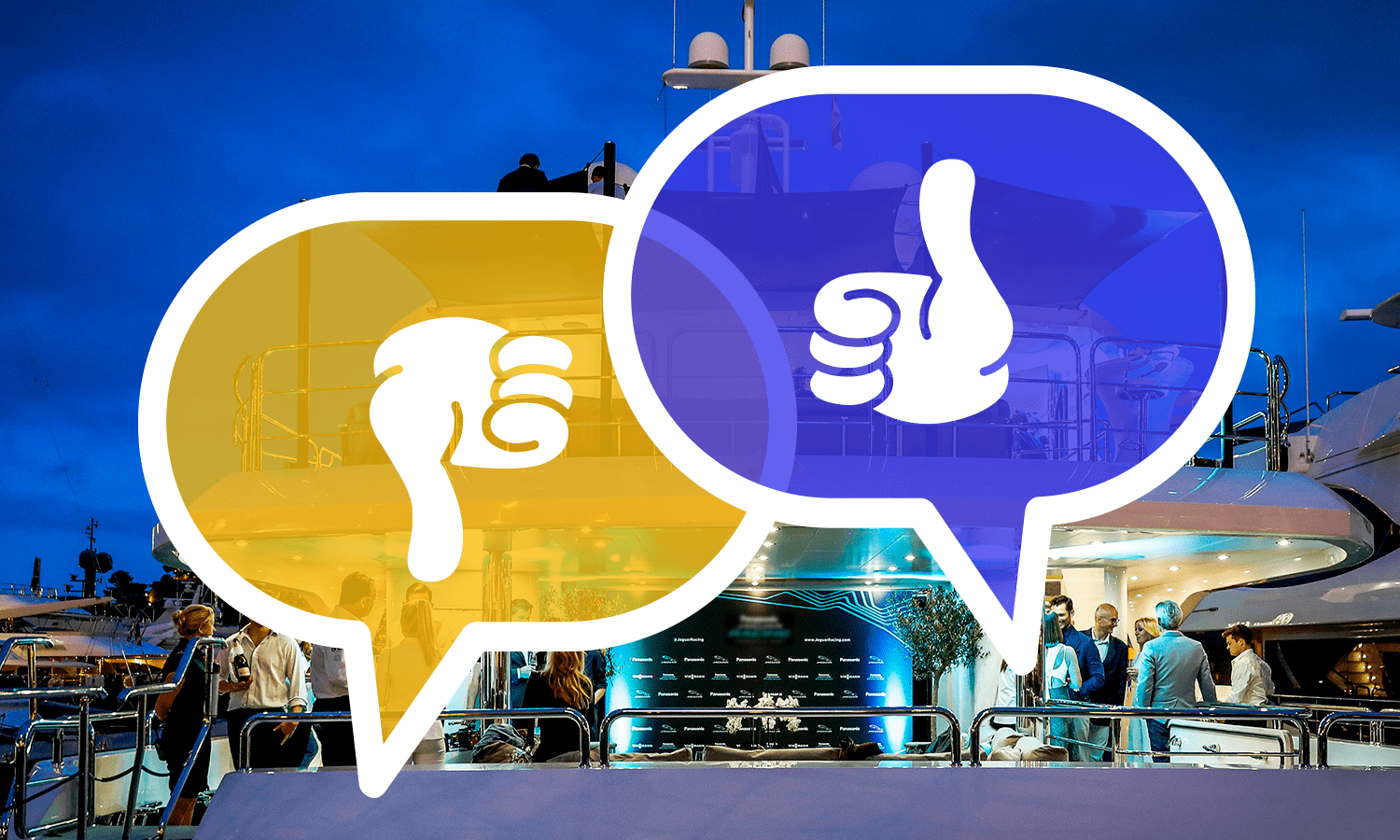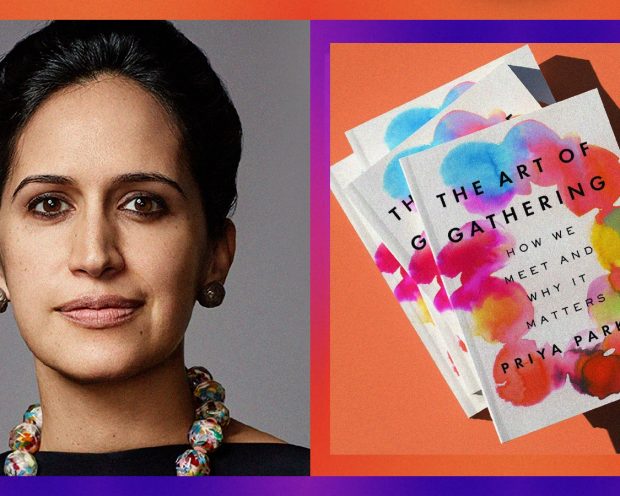Point / counterpoint: Is the boondoggle dead?

What comes to mind when you think “boondoggle?” A waste of time? A waste of money? Crafts you used to make at camp? While the traditional definition may have fallen out of the lexicon (except on conservative Twitter, of all places), in the experiential world a boondoggle is any event where the extravagance and activities seem to overpower the purpose.
We’ve all left a trade show or conference reminiscing about that happy hour on the boat or the surprise concert on the last night. Then wondering… did I actually learn anything? Meet anyone important? Accomplish anything other than a hangover? Think of Parks & Rec’s infamous Entertainment 720. Or, in the real world, SXSW and Cannes Lions.
It was easy to be allured by boondoggles in the Before Times. Meetings were conveniently planned in Vail ski resorts, looking at you CRASH Conference, or on a tropical beach, same, ICBMSI. But during the Covid Reckoning, people became much more conscious of how they spend their precious time and money. Throw in a slew of other factors — new travel complications, climate consciousness, virtual alternatives, Covid risk — and you might reasonably conclude that the boondoggle is dead.
But is it really? And if so, who killed it?
POINT: THE BOONDOGGLE IS DEAD
The evidence includes:
The staying power of virtual events
After a full year of virtual pivots, every summit, conference and festival saw not only the drawbacks, but also the benefits of a virtual alternative. Many continue to expand their online (or at least hybrid) offerings even as the IRL experiences return to their former glory. Both hosts and attendees must reckon with the question: Why choose in-person over virtual? And there’s not always a compelling answer. The current big swing back to IRL events doesn’t yet mean a return to normal, especially for business travel with countless hybrid alternatives.
The Covid of it all
Planning anything during the waves of Covid presents risk, even aside from those posed to attendee health. It’s nearly impossible to predict when and where the next variant will arise and which events will be impacted. Those brave enough to push forward need to have the financial security of larger organizations behind them and a purpose worthy of pivoting, if and when Deltacron or Pi surges.
The demand for purposeful gathering
We spoke to author and podcaster Priya Parker on her book The Art of Gathering and how to create meaning in group settings. In 2020, it was the antidote to our collective exhaustion with Zoom Happy Hours and Virtual Office Water Coolers. As Parker reminded us, when it comes to any gathering, “the transaction costs should be worth the payoff of what actually happens during the event.”
The lack of big-name growth
You’ve heard of the hub and spoke method (from the desk of David Adler) in which events have a main “hub” experience and satellite “spoke” activations that attendees can pick and choose from. The hubs of festivals like Comic-Con International and TED haven’t necessarily grown in recent years. However, their satellite installments (local Comic-Cons and TEDxs) are thriving. Why? Because we gravitate toward well-established, household names that are easily accessible. And it’s way easier to do something locally, than invest that much time (and money) getting on a plane, missing meetings, being away from your Covid-nest. Anything else feels like… well, a boondoggle — a waste of your now-very-precious time with very little in return.
COUNTERPOINT: THE BOONDOGGLE IS BACK, BABY
The lack of connectedness with virtual events
Gatherings feel less personal from behind a screen. We’ll leave the exact reasoning to the scientists, but virtual interactions reduce our mobility and challenge nonverbal communication. And we’ll take any excuse to use the precious time between case spikes to connect in person, whether it’s purposeful or not. Who else has plans to go to a wedding this year for a couple who officially got married in 2020?
The renewed excitement of business travel
Booking a week-long vacation to France might feel uncouth right now (not that we’re judging you). But flying to Nice for Cannes Lions? Perfectly acceptable. Events, festivals and trade shows are BACK in popular travel destinations — Las Vegas, Barcelona, Miami, Aspen, Basel — to attract professionals who want to pair the hustle with a side of vacation mode. Five days in a convention center in Phoenix just isn’t going to get people on a plane anymore. There needs to be an element of fun, discovery and exploration. And it needs to be worth your time.
The need for face-to-face interaction
Meeting with others in your industry tribe to discuss ideas and share experiences has value, both personal and professional. And it doesn’t even need to fall under that old label of “networking.” There’s great networking value in sharing “boondoggle-y” experiences outside a convention hall.
The expansion of tried-and-true events
Today, Art Basel is way more than a few pop-up galleries by the beach. It’s the sort of established, purpose-driven event that brands, creatives and influencers can all capitalize on, through activations and immersive experiences — and yes, parties — that more than justify the travel and spending they require. There’s just so much to see, might as well spend a few days … on the expense account, amiright?
THE VERDICT
It’s fair to say that the boondoggle has undergone a transformation. Post-Covid (lol) our BS-meters are cranked up to 11, and consumers and business folk alike are looking critically at how they spend their time and resources. The dead version of the boondoggle, you might say, is the old “business being done on the golf course.” Today, experiential creators are charged with crafting high-value events that bring people together as a community again.
Gen-Z professionals especially need these “nothing” events; many of them have never experienced traditional office culture. They know their coworkers only through a screen, from the neck up, with no workplace social interaction (which, granted, can be toxic, so that’s not necessarily all bad news). Boondoggles give them a vital chance to work (and play) in groups again. And guess what, Gen Z or not, we’ve all missed being in person with our work #fam.
But really, it all goes back to one of our favorite sayings… Don’t do boring sh*t. If you want to get people to cast away their post- (lol) Covid hermit tendencies, make it really freaking cool, let people connect, and create meaningful experiences. And for those opting to stay at home, at least make the virtual journey worth their time, as well. In other words: The boondoggle is dead… Long live the boondoggle!
Join us in XP Land. A community for experiential creatives and experience-makers, brand leaders and IP-owners, space stewards and venue visionaries — all of those in the business of epic gatherings and live, immersive storytelling.
